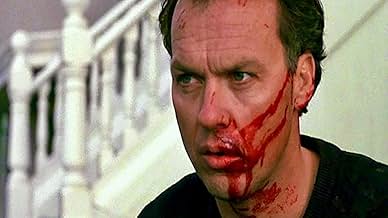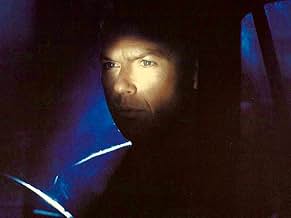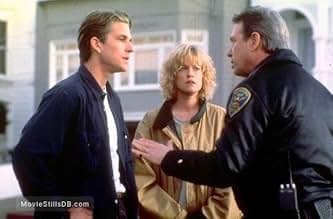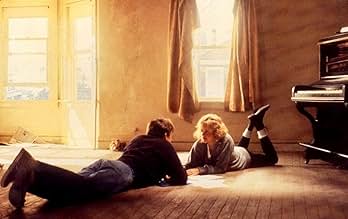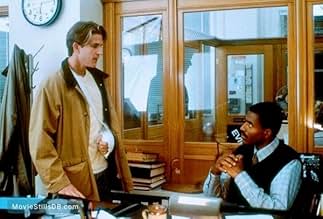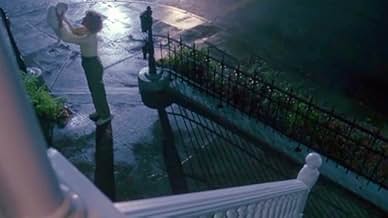CALIFICACIÓN DE IMDb
6.4/10
24 k
TU CALIFICACIÓN
Una pareja trabaja arduamente para restaurar la casa de sus sueños y convertirse en propietarios para pagarla. Por desgracia, uno de sus inquilinos tiene sus propios planes.Una pareja trabaja arduamente para restaurar la casa de sus sueños y convertirse en propietarios para pagarla. Por desgracia, uno de sus inquilinos tiene sus propios planes.Una pareja trabaja arduamente para restaurar la casa de sus sueños y convertirse en propietarios para pagarla. Por desgracia, uno de sus inquilinos tiene sus propios planes.
- Dirección
- Guionista
- Todo el elenco y el equipo
- Producción, taquilla y más en IMDbPro
Opiniones destacadas
William Goldman says that the last 15 minutes are the most important of any movie and that's what saves what is otherwise a sometimes fascinating but often dull film in "Pacific Heights."
The plot line is fairly interesting but feels rather drawn out through most of the film, until the fantastic ending pulls out all the stops and turns the film into something good. The writing in general is a bit contrived and the dialogue fairly wooden, but it isn't quite enough to destroy the film even early.
The acting is very uneven, led by a terrible Melanie Griffith and a middling performance by Matthew Modine in terms of screen time, but certainly controlled by the fantastic performance of Michael Keaton, one of the world's greatest actors. Keaton is especially fantastic in the final sequence, from his charming act with the old woman to his harrowing, venemous final scene there is a complete change in who he is and it is all the more frightening and powerful for the juxtaposition.
Schlesinger's direction, besides Keaton's performance, is probably the saving grace of the film. He manages to inject a beautiful dark style to the film that the script rather lacks but seems to want while also keeping us in a blunt reality with the plain, simple outdoor shots. His use of lighting and well-chosen camera angles wonderfully play up the situation.
Overall, "Pacific Heights" is a middling film with a fantastic performance by Michael Keaton and good direction by John Schlesinger that turns into something better with its fantastic, surprising, venemously satisfying ending. If you watch it, though, don't give up on it 'til it's over.
The plot line is fairly interesting but feels rather drawn out through most of the film, until the fantastic ending pulls out all the stops and turns the film into something good. The writing in general is a bit contrived and the dialogue fairly wooden, but it isn't quite enough to destroy the film even early.
The acting is very uneven, led by a terrible Melanie Griffith and a middling performance by Matthew Modine in terms of screen time, but certainly controlled by the fantastic performance of Michael Keaton, one of the world's greatest actors. Keaton is especially fantastic in the final sequence, from his charming act with the old woman to his harrowing, venemous final scene there is a complete change in who he is and it is all the more frightening and powerful for the juxtaposition.
Schlesinger's direction, besides Keaton's performance, is probably the saving grace of the film. He manages to inject a beautiful dark style to the film that the script rather lacks but seems to want while also keeping us in a blunt reality with the plain, simple outdoor shots. His use of lighting and well-chosen camera angles wonderfully play up the situation.
Overall, "Pacific Heights" is a middling film with a fantastic performance by Michael Keaton and good direction by John Schlesinger that turns into something better with its fantastic, surprising, venemously satisfying ending. If you watch it, though, don't give up on it 'til it's over.
An unusual choice for Michael Keaton to follow up his first "Batman" movie with him going from hero and to outright villain.
Plot In A Paragraph: Drake Goodman (Modine) and Patty Palmer (Griffith)an unmarried couple, purchase an expensive 19th-century house in the exclusive Pacific Heights neighbourhood. They rent one of the building's two first-floor apartments to the Watanabes, a kindly Japanese couple. Not long after, Carter Hayes (Keaton) visits to view the remaining vacant unit and immediately expresses a desire to move in. Hayes drives an expensive Porsche and carries large amounts of cash on him. He convinces Drake to waive the credit check in exchange for a list of personal references and an upfront payment of the first six months' rent, to be paid by wire transfer. Before any of that happens he moves in unannounced and refuses to leave.
Melanie Griffith whilst looking great is awful acting wise, and Matthew Modine had me questioning how this man forged a career as an actor. Some of my main annoyances came from his character, and I had my concerns that he may end up being the real psycho, but his performance really was dire.
It's Keaton as the villain of the piece, who shines and gives the movie it's best scenes. Tippi Hedren and Dan Hedaya have small roles and Beverley D'Angelo has an uncredited role as a former lover/business partner of Carter's. I'm not sure why she is uncredited though.
Plot In A Paragraph: Drake Goodman (Modine) and Patty Palmer (Griffith)an unmarried couple, purchase an expensive 19th-century house in the exclusive Pacific Heights neighbourhood. They rent one of the building's two first-floor apartments to the Watanabes, a kindly Japanese couple. Not long after, Carter Hayes (Keaton) visits to view the remaining vacant unit and immediately expresses a desire to move in. Hayes drives an expensive Porsche and carries large amounts of cash on him. He convinces Drake to waive the credit check in exchange for a list of personal references and an upfront payment of the first six months' rent, to be paid by wire transfer. Before any of that happens he moves in unannounced and refuses to leave.
Melanie Griffith whilst looking great is awful acting wise, and Matthew Modine had me questioning how this man forged a career as an actor. Some of my main annoyances came from his character, and I had my concerns that he may end up being the real psycho, but his performance really was dire.
It's Keaton as the villain of the piece, who shines and gives the movie it's best scenes. Tippi Hedren and Dan Hedaya have small roles and Beverley D'Angelo has an uncredited role as a former lover/business partner of Carter's. I'm not sure why she is uncredited though.
Sometimes art imitates life and truth is stranger than fiction. I say that because last year four homeless women in Oakland, California squatted in a vacant house and refused to leave. They called themselves Moms4Housing and they made a mini-movement out of their theft. Instead of being summarily evicted from the house, the matter had to go to court. Their claim was that housing is a human right and since this home was vacant they had a right to it. The whole ordeal took about five months or so to be settled with the court ruling in favor of the company that owned the home. In this case, the owner of the home was a business that could afford to go to court and wasn't pressed for an immediate need of the house.
Which brings us to "Pacific Heights." A man by the name of Carson Hayes (Michael Keaton) simply moved into a vacant unit in a Victorian home in San Francisco without paying money and without permission. Due to the tenant-favoring laws, Drake (Matthew Modine) and Patty (Melanie Griffith) could not simply kick Carson out. They had to go through a lengthy and costly process to remove him which cost them all their savings and nearly their lives.
Carson wasn't a rent paying tenant whose rent just got jacked up by 50%, nor was he a rent paying tenant that was being evicted for some arbitrary reason, he was a slick con man that found a loophole in the system that protected his conniving con.
This was a tense movie in which you hoped to learn what Carson's motives were and what was his end game. The onion was peeled back a little, but I was never really satisfied with the explanation.
Michael Keaton was strong as the antagonist. This was back when he was crushing it on screen with movies like "BeetleJuice" and "Batman." Matthew Modine and Melanie Griffith were weak castings. I must admit, I think Melanie is a weak casting in anything, but she was an especially weak casting in this movie.
The story itself and the pacing was good. I liked it as a suspense thriller, but whatever the intent of the writer was, I don't think the cities in the S.F. Bay Area heard him.
Which brings us to "Pacific Heights." A man by the name of Carson Hayes (Michael Keaton) simply moved into a vacant unit in a Victorian home in San Francisco without paying money and without permission. Due to the tenant-favoring laws, Drake (Matthew Modine) and Patty (Melanie Griffith) could not simply kick Carson out. They had to go through a lengthy and costly process to remove him which cost them all their savings and nearly their lives.
Carson wasn't a rent paying tenant whose rent just got jacked up by 50%, nor was he a rent paying tenant that was being evicted for some arbitrary reason, he was a slick con man that found a loophole in the system that protected his conniving con.
This was a tense movie in which you hoped to learn what Carson's motives were and what was his end game. The onion was peeled back a little, but I was never really satisfied with the explanation.
Michael Keaton was strong as the antagonist. This was back when he was crushing it on screen with movies like "BeetleJuice" and "Batman." Matthew Modine and Melanie Griffith were weak castings. I must admit, I think Melanie is a weak casting in anything, but she was an especially weak casting in this movie.
The story itself and the pacing was good. I liked it as a suspense thriller, but whatever the intent of the writer was, I don't think the cities in the S.F. Bay Area heard him.
This is a carefully programmed yuppie nightmare, something to titillate the emotions betwixt the sushi and the creme de mint, something to remind the upwardly mobile that you have to keep your guard up at all times because there are animals out there waiting to take it all away from you.
Clever plot premise: Yuppie couple, stylishly unmarried, possibly for tax purposes, buy a painted lady in the Pacific Heights district of San Francisco, a Victorian fixer upper for $750,000. It's the 1980's and everybody is getting rich in California real estate. They are now in yuppie heaven since there are two rentals on the property which take care of $2300 of the $3700 monthly mortgage, which leaves them responsible for only $1400, which is less then they were paying before, and now they have a huge tax write-off and hopefully an appreciating property. Of course they are margined to the gills, but what can go wrong?
How about the tenant from hell? Forget about your wild parties and your late-with-the-rent dead beats. This guy (Michael Keaton as a slimy, upper crust psycho genius) doesn't even pay the deposit. He just moves in, squats, and our yuppie couple is helpless to get rid of him since by law he now has possession. He changes the locks, cultivates big ugly oriental cockroaches, and pounds away at all hours of the night, and chases off the other tenant. Seems he has done this before. Seems it is an elaborate scam to gain total possession of the entire property. Next to go are the owners.
Naturally the cops and the law seem to work for him, not our adorable couple. (This is a little fictional reality to further excite the passions of the audience, call it poetic license, since we all know that the tenant/landlord laws in California are written by and for the propertied class, as they are anywhere else, as is only right.)
But this is a morality play. Could it be that our yuppies are undeserving of their wealth and are easy prey in the econ jungle because of their naiveté? Could be. But as this is a modern morality tale, you can be sure that the woman, played with worrisome lines under her eyes by the ever adorable Melanie Griffith, will turn the tables and kick some male butt despite the handicap of having a not too bright boyfriend, who is easily manipulated by our villain into some rather stupid male behavior that makes things worse for our heroine. Incidentally, he is played with such annoying exactitude by Matthew Modine that I can hear the rednecks in the audience screaming: "Die yuppie scum!"
It should be noticed that the adversary of the yuppies is not your standard ghetto dweller, but a wayward member of the upper class, a fitting adversary in this yuppie trial by fire.
I'll let you guess who wins.
(Note: Over 500 of my movie reviews are now available in my book "Cut to the Chaise Lounge or I Can't Believe I Swallowed the Remote!" Get it at Amazon!)
Clever plot premise: Yuppie couple, stylishly unmarried, possibly for tax purposes, buy a painted lady in the Pacific Heights district of San Francisco, a Victorian fixer upper for $750,000. It's the 1980's and everybody is getting rich in California real estate. They are now in yuppie heaven since there are two rentals on the property which take care of $2300 of the $3700 monthly mortgage, which leaves them responsible for only $1400, which is less then they were paying before, and now they have a huge tax write-off and hopefully an appreciating property. Of course they are margined to the gills, but what can go wrong?
How about the tenant from hell? Forget about your wild parties and your late-with-the-rent dead beats. This guy (Michael Keaton as a slimy, upper crust psycho genius) doesn't even pay the deposit. He just moves in, squats, and our yuppie couple is helpless to get rid of him since by law he now has possession. He changes the locks, cultivates big ugly oriental cockroaches, and pounds away at all hours of the night, and chases off the other tenant. Seems he has done this before. Seems it is an elaborate scam to gain total possession of the entire property. Next to go are the owners.
Naturally the cops and the law seem to work for him, not our adorable couple. (This is a little fictional reality to further excite the passions of the audience, call it poetic license, since we all know that the tenant/landlord laws in California are written by and for the propertied class, as they are anywhere else, as is only right.)
But this is a morality play. Could it be that our yuppies are undeserving of their wealth and are easy prey in the econ jungle because of their naiveté? Could be. But as this is a modern morality tale, you can be sure that the woman, played with worrisome lines under her eyes by the ever adorable Melanie Griffith, will turn the tables and kick some male butt despite the handicap of having a not too bright boyfriend, who is easily manipulated by our villain into some rather stupid male behavior that makes things worse for our heroine. Incidentally, he is played with such annoying exactitude by Matthew Modine that I can hear the rednecks in the audience screaming: "Die yuppie scum!"
It should be noticed that the adversary of the yuppies is not your standard ghetto dweller, but a wayward member of the upper class, a fitting adversary in this yuppie trial by fire.
I'll let you guess who wins.
(Note: Over 500 of my movie reviews are now available in my book "Cut to the Chaise Lounge or I Can't Believe I Swallowed the Remote!" Get it at Amazon!)
I saw this movie again recently, and I have to say that upon reconsideration I think this film is a bit underrated. There are a few deeper sociological issues being explored here that I perceive but are quite subtle in their appearance in the film.
It is a study about the law to some degree, and it has some critical things to say about the ability for one who knows the law and its loopholes and thus exploits others with tools that were originally intended to preserve civil society. Keaton plays a psycho, but one who is highly educated and quite adept at his craft of fraud and deceit.
Further, Modine's character is irrational, befuddled, and ultimately marginalized. I wonder if the director took some liberties with him (as this is a true story, I don't know everything about the real person he portrays) to bring out a few of his close-minded tendencies that may have contributed to the awful situation in which he finds himself. Obviously, there is the closet racism which keeps him from renting to a black man (this is thrown in the viewer's face later and is quite obvious), but there is also the way he perceives a man's role as the solver of problems and his wife as nothing more than a spectator.
That she ends up being the one to calmly and coolly affect a search for and investigate Keaton's character, assaults the traditional notions of a man's role as a protector. Her temperament is ultimately more appropriate for the solution to the problem, and I think it is no accident that the director portrays it in this way.
It is a study about the law to some degree, and it has some critical things to say about the ability for one who knows the law and its loopholes and thus exploits others with tools that were originally intended to preserve civil society. Keaton plays a psycho, but one who is highly educated and quite adept at his craft of fraud and deceit.
Further, Modine's character is irrational, befuddled, and ultimately marginalized. I wonder if the director took some liberties with him (as this is a true story, I don't know everything about the real person he portrays) to bring out a few of his close-minded tendencies that may have contributed to the awful situation in which he finds himself. Obviously, there is the closet racism which keeps him from renting to a black man (this is thrown in the viewer's face later and is quite obvious), but there is also the way he perceives a man's role as the solver of problems and his wife as nothing more than a spectator.
That she ends up being the one to calmly and coolly affect a search for and investigate Keaton's character, assaults the traditional notions of a man's role as a protector. Her temperament is ultimately more appropriate for the solution to the problem, and I think it is no accident that the director portrays it in this way.
¿Sabías que…?
- TriviaScreenwriter Daniel Pyne once rented an apartment to a tenant that he could not evict. The film was inspired by this scenario.
- ErroresThe policeman quotes an entirely non-factual law to Drake about a tenant having rights just because a tenant physically enters a building, even at the time the movie was made. No tenant has any legal right to remain on the premises of a single-family or multiple-family dwelling in any state without payment, and furthermore, because of Carter Hayes destructive acts (e.g., releasing the cockroaches and physical damage to the unit), Drake had more than enough good cause to have Carter forcibly evicted, either by the City of San Francisco police or the San Francisco County sheriff.
- Citas
Amy: Patty?
Patty Palmer: Yeah?
Amy: Do you mind if I ask you why you're selling? I mean, you've done so much to this place. You've obviously put your heart in it.
Patty Palmer: [Ironically] No, not really. It was just an investment.
- Créditos curiososMelanie Griffith's character Patty Palmer is credited as Patty Parker in the credits.
- ConexionesEdited into The Green Fog (2017)
- Bandas sonorasVivaldi: Summer - The Four Seasons
Music by Antonio Vivaldi (uncredited)
Performed by Pinchas Zukerman (as Pinchas Zuckerman) and Israel Philharmonic Orchestra (as The Israeli Philharmonic)
Courtesy of Deutsche Gramaphon, a division of PolyGram Classics, Inc.
Selecciones populares
Inicia sesión para calificar y agrega a la lista de videos para obtener recomendaciones personalizadas
Detalles
- Fecha de lanzamiento
- País de origen
- Idiomas
- También se conoce como
- De repente, un extraño
- Locaciones de filmación
- Potrero Hill, San Francisco, California, Estados Unidos(1243 19th St, San Francisco, CA 94107)
- Productora
- Ver más créditos de la compañía en IMDbPro
Taquilla
- Presupuesto
- USD 18,000,000 (estimado)
- Total en EE. UU. y Canadá
- USD 29,381,956
- Fin de semana de estreno en EE. UU. y Canadá
- USD 6,912,637
- 30 sep 1990
- Total a nivel mundial
- USD 44,926,706
- Tiempo de ejecución
- 1h 42min(102 min)
- Color
- Mezcla de sonido
- Relación de aspecto
- 1.85 : 1
Contribuir a esta página
Sugiere una edición o agrega el contenido que falta


